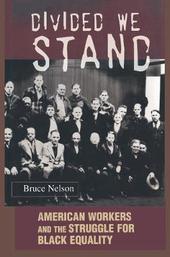
|
Divided We Stand: American Workers and the Struggle for Black Equality
Paperback / softback
Main Details
| Title |
Divided We Stand: American Workers and the Struggle for Black Equality
|
| Authors and Contributors |
By (author) Bruce Nelson
|
| Series | Politics and Society in Modern America |
|---|
| Physical Properties |
| Format:Paperback / softback | | Pages:440 | | Dimensions(mm): Height 235,Width 152 |
|
| ISBN/Barcode |
9780691095349
|
| Classifications | Dewey:331.6396073 |
|---|
| Audience | | Professional & Vocational | | Tertiary Education (US: College) | |
|---|
| Illustrations |
26 halftones
|
|
Publishing Details |
| Publisher |
Princeton University Press
|
| Imprint |
Princeton University Press
|
| Publication Date |
15 January 2002 |
| Publication Country |
United States
|
Description
Divided We Stand is a study of how class and race have intersected in American society--above all, in the "making" and remaking of the American working class in the nineteenth and twentieth centuries. Focusing mainly on longshoremen in the ports of New York, New Orleans, and Los Angeles, and on steelworkers in many of the nation's steel towns, it examines how European immigrants became American and "white" in the crucible of the industrial workplace and the ethnic and working-class neighborhood. As workers organized on the job, especially during the overlapping CIO and civil rights eras in the middle third of the twentieth century, trade unions became a vital arena in which "old" and "new" immigrants and black migrants forged new alliances and identities and tested the limits not only of class solidarity but of American democracy. The most volatile force in this regard was the civil rights movement. As it crested in the 1950s and '60s, "the Movement" confronted unions anew with the question, "Which side are you on?"This book demonstrates the complex ways in which labor organizations answered that question and the complex relationships between union leaders and diverse rank-and-file constituencies in addressing it. Divided We Stand includes vivid examples of white working-class "agency" in the construction of racially discriminatory employment structures. But Nelson is less concerned with racism as such than with the concrete historical circumstances in which racialized class identities emerged and developed. This leads him to a detailed and often fascinating consideration of white, working-class ethnicity but also to a careful analysis of black workers--their conditions of work, their aspirations and identities, their struggles for equality. Making its case with passion and clarity, Divided We Stand will be a compelling and controversial book.
Author Biography
Bruce Nelson is Professor of History at Dartmouth College. His first book, Workers on the Waterfront, was awarded the Frederick Jackson Turner Prize by the Organization of American Historians.
Reviews"A superbly written, intellectually exciting and pioneering book ... Nelson weds detailed research with indepth interviews, oral histories and his own first-hand experience ... With grace and acuity, Nelson unites his far-ranging concerns successfully argues that race and ethnicity have long been central issues in the labor movement ... This book has the potential to profoundly change how we read and think about American history."--Publishers Weekly "This study moves labor historians one step closer to the overarching synthesis that has eluded them for over 30 years ... This is an important piece of scholarship that deserves wide attention and debate."--Choice "A powerful and disturbing book about the nature of race relations in working-class America."--Peter Cole, History: Reviews of New Books "A valuable contribution to the increasingly acrimonious debate over the meaning, content, and significance of white racial identity in American labor history."--Steven A. Reich, Journal of Southern History "By placing working-class white racism and black resistance strategies at the forefront of his study, Nelson's Divided We Stand reinforces recent scholarship on the interplay of class and race formation in nineteenth and twentieth century United States and African American history."--Joe W. Trotter, Journal of American Ethnic History "A landmark study of race and trade unionism in longshoring and steel from the rise of heavy industry in the late 1800s to its decline in the 1980s... Nelson digs deeply into archival sources and oral interviews to describe real workers and their shop-floor experience in compelling detail."--Frank Towers, The Historian
|